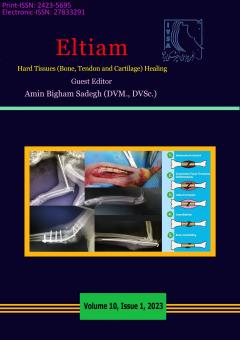A Review of Structure and Mechanisms of Tendon Injury and Repair in Small Animals
Subject Areas : Veterinary Soft and Hard Tissue SurgeryFatemeh Iraji 1 * , Aboutorab Tabatabaei Naeini 2
1 - DVM Graduated, Faculty of Veterinary Medicine, Shiraz University, Shiraz, Iran
2 - Department of Clinical Sciences, Faculty of Veterinary Medicine, Shiraz University, Shiraz, Iran
Keywords: Healing, Tendon, structure, mechanism,
Abstract :
Tendons are soft connective tissues composed of parallel collagen fibers embedded in an extracellular matrix. This organized structure allows the tendons to bear and transfer large forces between the muscle and the bone. Tendons contain 86% collagen, 1-5% proteoglycan ,and 2% elastin, which are calculated as dry weight, and water is responsible for 60-80% of the wet weight of the whole tendon. Tendon healing can be generally divided into 3 phases; the repair, inflammation, and remodeling phases. Although the tensile strength of the healed tendon improves over time, it does not reach the level of uninjured tissue.
1.
Docheva D, Müller SA, Majewski M, Evans CH. Biologics for tendon repair. Advanced drug delivery reviews. 2015;84:222-39. 2. Jeong C, Kim SE, Shim K-S, Kim H-J, Song MH, Park K, et al. Exploring the in vivo anti-inflammatory actions of simvastatin-loaded porous microspheres
on inflamed tenocytes in a collagenase-induced animal model of Achilles tendinitis. International journal of molecular sciences. 2018;19(3):820. 3. Jiang D, Gao P, Lin H, Geng H. Curcumin improves tendon healing in rats: a histological, biochemical, and functional evaluation. Connective tissue research. 2016;57(1):20-7
. 4. Frank C, Woo S-Y, Amiel D, Harwood F, Gomez M, Akeson W. Medial collateral ligament healing: a multidisciplinary assessment in rabbits. The American
journal of sports medicine. 1983;11(6):379-89. 5. Frank C, McDonald D, Bray D, Bray R, Rangayyan R, Chimich D, et al. Collagen fibril diameters in the healing adult rabbit medial collateral ligament.
Connective tissue research. 1992;27(4):251-63. 6.
O'Brien M. Functional anatomy and physiology of tendons. Clinics in sports medicine. 1992;11(3):505-20. 7. SL W. Anatomy, biology, and biomechanics of tendon and ligament. Orthopaedic basic science: biology and blamechanics of the musculoskeletal
system. 2000:582-616. 8.
LG J. Human tendons: anatomy, physiology and pathology. Human kinetics. 1997. 9. Chaplin D. The vascular anatomy within normal tendons, divided tendons, free tendon grafts and pedicle tendon grafts in rabbits: a
microradioangiographic study. The Journal of Bone & Joint Surgery British Volume. 1973;55(2):369-89. 10.
Fahie MA. Healing, diagnosis, repair, and rehabilitation of tendon conditions. Veterinary Clinics: Small Animal Practice. 2005;35(5):1195-211. 11.
Harari J. Surgical complications and wound healing in the small animal practice. (No Title). 1993. 12.
Johnston DE. Tendons, skeletal muscles, and ligaments in health and disease. 1985. 13.
Slatter DH. Textbook of small animal surgery: Elsevier health sciences; 2003. 14. Hatanaka H, Manske PR. Effect of suture size on locking and grasping flexor tendon repair techniques. Clinical Orthopaedics and Related Research
(1976-2007). 2000;375:267-74. 15. Pijanowski GJ, Stein LE, Turner TA. Strength characteristics and failure modes of suture patterns in severed goat tendons. Veterinary Surgery.
1989;18(5):335-9. 16.
Thomopoulos S, Parks WC, Rifkin DB, Derwin KA. Mechanisms of tendon injury and repair. Journal of Orthopaedic Research. 2015;33(6):832-9. 17.
Gomez M. The physiology and biochemistry of soft tissue healing. Rehabilitation of the injured knee. 1995:34-44. 18.
Montgomery R, editor Healing of muscle, ligaments, and tendons. Seminars in veterinary medicine and surgery (small animal); 1989. 19.
Fenwick SA, Hazleman BL, Riley GP. The vasculature and its role in the damaged and healing tendon. Arthritis Research & Therapy. 2002;4(4):1-9. 20.
Gelberman R, Chu C, Williams C, Seiler 3rd J, Amiel D. Angiogenesis in healing autogenous flexor-tendon grafts. JBJS. 1992;74(8):1207-16. 21.
Grinnell F. Fibronectin and wound healing. Journal of cellular biochemistry. 1984;26(2):107-16. 22.
Lin TW, Cardenas L, Soslowsky LJ. Biomechanics of tendon injury and repair. Journal of biomechanics. 2004;37(6):865-77. 23.
Buckwalter JA, Hunziker EB. Healing of bones, cartilages, tendons, and ligaments: a new era. The Lancet. 1996;348:S18.

